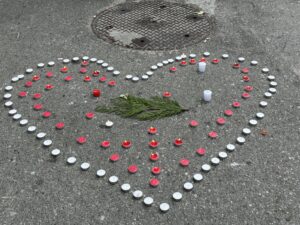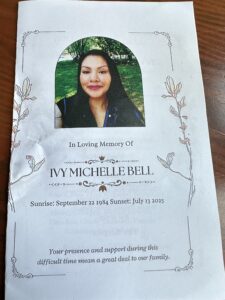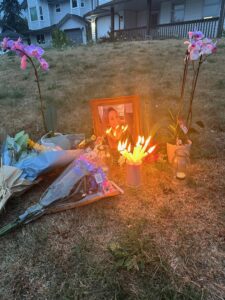From Vigils to Action: Toward Ending Femicide in British Columbia
Last weekend, we attended the vigil for Ivy Michelle Bell. Yesterday, we gathered with family and community to honour Jessica Cunningham. This Saturday, we will travel to Kelowna for the celebration of life for Bailey McCourt.
These gatherings are moments of profound grief. They are also reminders of love — the love that families, friends, and communities hold for women whose lives have been stolen. Each woman was unique, cherished, and irreplaceable. And each should still be alive today.
And just this past Friday, Vancouver police confirmed that two women were killed and one woman seriously injured. A man has since been arrested and charged with second-degree murder and aggravated assault. While details are still emerging, what is already clear is that this case belongs to a devastating pattern: in just 13 months, 34 women have been killed in British Columbia.
A Devastating and Preventable Pattern
Whether inside their homes or in public spaces, women and girls are being killed by men. Some by partners or ex-partners, some by acquaintances, some by strangers. These are not isolated tragedies. They are the visible tip of a crisis that has been normalized, dismissed, and too often explained away as private.
We need to be clear: femicide is preventable. Every one of these women should still be alive. Every community gathering at a vigil this month is mourning not just the loss of one life, but the failure of a society that refuses to take violence against women seriously as a matter of public safety.
What Women and Girls Are Carrying
Each time another headline announces a woman killed or a sexual assault, women and girls across BC feel the weight:
- Fear and Hyper-Vigilance – “It could be me. It could be my daughter. It could be my friend.” Women and girls are reminded again that their daily safety is not guaranteed — on the street, in their homes, at school, at work. They carry an invisible burden of safety planning: checking surroundings, sharing locations, avoiding certain spaces, calculating risks in relationships.
- Anger and Frustration – “Why does this keep happening? Why doesn’t anything change?” Many feel outrage at the normalization of male violence, and at systems (police, courts, governments) that appear reactive at best, negligent at worst. There’s anger at hearing condolences instead of commitments, promises instead of action.
- Grief and Exhaustion – “Another one. Again. I can’t bear to read the details.” For survivors, each new killing or assault can trigger trauma and memories of their own experiences. Even for those not directly affected, there is collective mourning and fatigue — the sense of an endless cycle of loss.
- Solidarity and Connection – “That could have been me — I understand her fear, her pain.” Many women and girls feel immediate empathy and identification with victims and survivors. This can fuel solidarity, mutual care, and collective calls to action — vigils, marches, petitions, demands.
- Distrust and Disillusionment – “The systems meant to protect us are failing.” News of another killing reinforces the sense that police, courts, governments, and community institutions do not prioritize women’s safety. Girls growing up with these headlines may begin to believe that violence is an inevitable part of being female.
- Resolve and Defiance – Alongside grief and fear, many women and girls channel their emotions into resistance: “We will not be silent. We will organize, fight, and protect each other.” Especially among younger generations, repeated tragedies are radicalizing new voices demanding systemic change.
This is the emotional climate that femicide creates. This is the reality that families, survivors, and communities are forced to carry while governments delay.
This is a Public Safety Crisis
If three men were killed on the street in one week, there would be immediate calls for a public inquiry and emergency action. When women are killed again and again — 34 in just over a year — we hear condolences, but not coordinated action.
Violence against women is not an unfortunate private matter. It is a public safety crisis. It belongs in the same category of urgent government response as wildfires, pandemics, and organized crime.
Five Immediate Actions to End Femicide
On July 20th, we presented the Premier with five immediate actions the Province of BC could take today to prevent femicide and save lives. These are not aspirational. They are feasible, affordable, and urgent:
- Mandate Municipal GBV Task Forces – Every city must convene a survivor-centred task force to coordinate safety across policing, housing, and justice.
- Stabilize Frontline Services – Provide a 15% emergency funding increase so crisis lines, outreach, and victim services can meet demand and keep survivors safe.
- Standardize Risk Assessment – Make intimate partner violence risk assessment tools mandatory across police, Crown, and child protection, with oversight and enforcement.
- Launch a Province-Wide Prevention Campaign – Use existing government communications infrastructure to educate the public and prevent intimate partner violence.
- Appoint a GBV Lead in Public Safety – Designate a dedicated provincial lead to coordinate this work across ministries and municipalities.
- These five steps will save lives. The solutions exist. What is missing is political will.
BWSS Advocacy and Municipal Leadership
BWSS has and continues to meet with government officials, ministries, and community organizations across BC to keep pushing for the change needed. We are advancing survivor-centred approaches to public safety, bringing evidence, solutions, and survivor voices to the table.
At the same time, we have begun our own work directly with mayors and councils. From Surrey to Burnaby, from Maple Ridge to Prince George, municipalities are stepping forward to recognize gender-based violence as a public safety crisis. Local governments are creating space for survivor-centred safety planning and demanding provincial leadership.
When municipal leaders say, “This is our responsibility too,” they are modeling the kind of courage the Province must now follow.
Grief, Rage, and Action
We will continue to stand with families at vigils, to bear witness to the lives taken, and to honour the love that communities carry forward. But grief alone is not enough. We will continue to rage at the systemic failures that leave women unprotected.
And we will continue to demand action until the killing stops. Families should not have to gather week after week in mourning. Women and girls deserve to live free from violence. British Columbia deserves a public safety system designed with survivors in mind.






